QuestionQUESTION: Hello, thank you for taking the time to answer my question. I woke up about a week ago and went to play with our Shiloh, and discovered that she had developed two large tumors on her body. I got her into the vet the same day, and he referred us to an exotic pet surgeon, which we took her to. The surgeon assured us that this was very common in female rats and could easily be remedied with surgery to remove the tumors, and spaying to help prevent recurrence. So we took her in today for her surgery...the vet discovered 2 more tumors in addition to the 2 she already had. The vet removed 3 of those tumors, and spayed her. The 4th tumor was to be scheduled for removal when we went back to have Shiloh's staples removed from this surgery. All went well during the surgery, and my husband even got a phone call from the vet saying Shiloh had done well and was recovering nicely. She had not woken up yet though. Unfortunately, as she began to come out of the anesthesia, the vet happened to be holding her in her lap, and Shiloh's eyes glazed over suddenly, and she began to have difficulty breathing. The vet and staff gave her oxygen and medication to help her, but her condition continued to deteriorate, and she died. They performed CPR on her for some time, but she did not respond. The vet finally had to stop the CPR. Everyone involved was shocked at this, as we had all expected Shiloh to come through this "routine" surgery unscathed and ready to live a long, happy life. The vet kindly offered to do an autopsy on Shiloh, which we agreed to, to see exactly what in the world had gone wrong. The results were that Shiloh had hypertrophic cardiomyopathy, wherein the left side of the heart muscle is very abnormally thick. Her lungs showed a great deal of congestion and scarring, which told us that at some point she had had rather severe pneumonia. A clot was also discovered in the lungs. I was wondering if you had ever heard of this sort of thing in rats before. Shiloh was about a year and a half old, given to us by someone at my school who could no longer care for her. She seemed to be in good health when we got her..I took her to our regular vet for a health check and all was well, except that she had a bit of a skin disorder that was treated with a topical liquid rubbed between her shoulderblades at two week intervals, 3 times. Upon her last visit to the vet for that about a month ago, she was given a clean bill of health.
I wanted to know if you have ever heard of such a thing as hypertrophic cardiomyopathy in rats. Is it congenital? Was Shiloh born this way or did she develop this over time? Would this condition cause any murmur that could be heard in a routine checkup? Could you discuss the signs and symptoms of pneumonia in rats? I feel that she had the pneumonia before we got her, as we have taken very good care of her, changing her bedding regularly and giving her lots of interaction with us. She was out of her cage alot of the time, perched on someone's shoulder, etc. We never knew anything was wrong. Is there something we should have known? Some sign that she was sick that we missed? Also, are blood clots common in rats? Is there anything we could have done? We are beside ourselves, as we love her so much, and this was so very unexpected. Especially after getting the call from the vet that she was doing so well. Thank you for any enlightenment you can give us.
ANSWER: Hi Melanie
First of all, I am really sorry for the loss of little Shiloh. It is already very upsetting to lose a rat, but for them to pass away when you are having procedures done to help her and to prolong their lives, and yet they die, its even more upsetting. Surgery carries risks,as we all know, and one of them is the way the body is going to respond to the anesthesia.
I do not see anywhere where you mentioned her age, but I am going to use my experience here and assume we are not dealing with a young rat and instead, she is at least over a year and a half old, especially since she had the mammary tumors. These tumors grow like crazy after menopause and are fueled by high estrogen levels. It is so common for intact elderly female rats to develop these horribly pesky tumors that you can almost bet that 7 out of 10 intact females. Prevention is to spay the rat while young, around 3 months old. The vet was correct when he said it is common for them to develop these tumors and the surgery is common, but again, it is not without risks. The risks with the tumor itself, for one thing, depends on how vascular the tumor has become and the location of the tumor. Although they are subcutaneous and rarely invasive (these tumors are also benign most of the time too) if they are near a major artery or have become very vascular, risk of blood loss is higher.
The problem here is not the surgical procedure itself, but it was the health of your rat that went undiagnosed.
In rats, young or old, but usually seen in older rats, hypertrophic cardiomyopathy and in fact this is fairly common as well. I have lost rats to heart disease, my own and clinic rats too. Often it was sudden death and the disease went pretty much undiagnosed, perhaps with just a sign of gradual weight loss as the only primary symptom.
The condition can also be inherited to answer your question, so if she did come from a breeder, I would let the breeder know ASAP so the line can be discontinued.
My question to you is: Has Shiloh been sick during her life and if so, what was wrong??
As far as diagnosis it goes, there are signs of heart disease that sometimes can even mock pneumonia, but other times the symptoms are subtle, often being overlooked. I wrote an article for my website discussing how to tell when your rat is seriously ill simply by his behavior. Simply noticing your rat has chosen an odd place to sleep rather than the same place he has used for so long; often a rat will seek the highest level of the cage and even perch on top of the highest object such as on top of their igloo or hidey house. They may also assume a position of laying flat with their chest pressed flat on the cage bottom in an attempt to use their abdominal muscles to help them breathe easier and they hang their head over the highest level or threshold. This helps them get better oxygen and they will display this behavior in cases of respiratory distress but also in cases of congestive heart failure. Other signs of cardiomyopathy include a syncopal episode when the rat appears to faint or pass out. This is due to cardiac arrhythmia.
You also may or may not notice weight loss, again, typical in the older rat.
The rat may appear to be tired, which we may also chalk it up to old age, another reason why this symptom is often overlooked.
Also, swelling of one of the rats feet may occur and again, causing us to overlook this as a possible sign of edema from heart disease and instead we think the little rat may have injured herself and twisted her foot, thus explaining the swelling.
Also as the rat ages, they tend to lose strength in their back legs. This is common and is called hind limb paresis often due to spinal nerve root compression and it is seen in both sexes but more often in males. However, it is also a sign that there is a probable blood clot that is contributing to this as well.
This also explains the pulmonary embolism (blood clot) that was discovered in your rats lungs during necropsy since thromboembolisms is common with this type of heart condition.
As for the scarring of the lungs, this leads me to believe that she has probably had her share of mycoplasmosis which can lead to pneumonia. Mycoplasmosis is known to cause scarring in the lungs much like you described to me about your girl.
BTW before I forget,the skin condition she had was mites and she was given revolution as a topical treatment, dispensed between the shoulder blades, to conquer the mites and when the mites bite her they die. Of course this is an educated guess....but i cant think of any other medication that is used topically between the shoulder blades.
As for signs of respiratory infection, you will notice much of the same signs as discussed above along with congestion, wheezing, open mouth breathing, possible cyanosis (blue or purple feet from lack of oxygen) gasping, total loss of appetite, lethargy, audible congestion when the rat breathes, excessive porphyrin discharge on nose and eyes.
Treatment is aggressive with oxygen being disturbed for several days while the rat is medicated which requires the rat to stay at the vet clinic. Antibiotic therapy that treats both myco and strep usually gentocin and baytril.
As for the heart disease your rat had, if it were diagnosed, treatment would also be medications such as a beta blocker, lasix if there are signs of congestive heart failure and other medications as well,often using one, if it doesn't work...move on to the next. The rat would need to live in a small cage so there was little mobility so she could not get exhausted.
Basically hypertrophic cardiomyopathy something that you do not want your rat to have to live with. Although there are medications that help, often its stressful for the rat to have to live a life that way, being kept calm, no playing hard...possibly not responding to the medications right and feeling scared due to possible not being able to breathe right.
Also, with the blood clot that was found, chances are that she would have passed away from this without the surgery causing complications.
In other words, there was no way to prevent this. You may or may not be feeling torn right now about having the surgery and the "what ifs" but again I will tell you that if she didn't have the surgery, her time here was very limited due to the condition of her heart and the pulmonary embolism. Even in humans,pulmonary embolisms are fatal.
Hopefully I helped enlighten you but if I skipped over anything please let me know. I will be glad to answer your questions.
Again, my condolences for your loss.
Sandy
---------- FOLLOW-UP ----------
QUESTION: Yes, you were very helpful, Sandy, thanks so much. Shiloh was approximately 2 years old. She had shown none of the symptoms you mention, which is why this was so shocking to us. She was eating well, drinking well, exercising, and moving without difficulty. Her habits and appearance did not change at all during the several months we had her, except for the sudden, seemingly overnight appearance of the tumors, which we saw to immediately. Based on yours and our vet's discussions, the best we can figure is that she must have been seriously ill at some point before we got her, and her previous owners just assumed she got well on her own, not realizing there were serious repercussions, such as the lung scarring, etc.
We will be getting another rat. We found out quite accidentally by adopting this little one that we love these little creatures...we came by her kind of out of desperation of her previous owner...it was us or the pound, and I could not let her go to the pound, so we became rattie parents.
Thank you again for your kind and informative comments.
Answer
Rats really make nice pets. There just isnt enough information out there on their care, or should I say there isnt enough "accurate" information out there. Its a relief when I do come across people like you and other rat owners that go the extra mile with their rats and take them to the vets and do what you need to do for them to get well again!

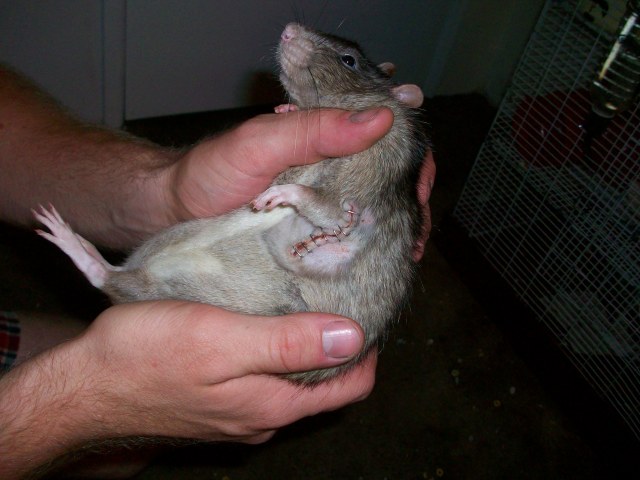 Rat-O being adorable
QuestionIncision closed with s
QUESTION: Hi Sand
Rat-O being adorable
QuestionIncision closed with s
QUESTION: Hi Sand
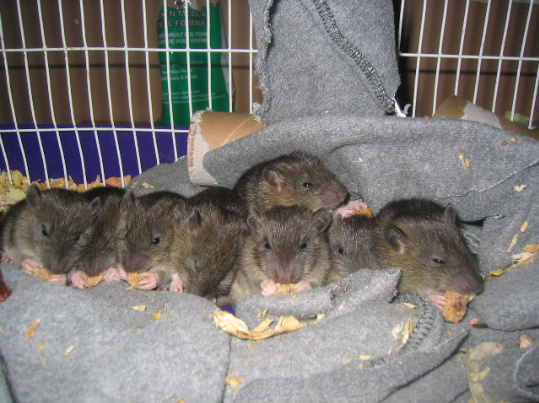 Baby Wild Rat
QuestionWe had a colony of wild rats living under our s
Baby Wild Rat
QuestionWe had a colony of wild rats living under our s
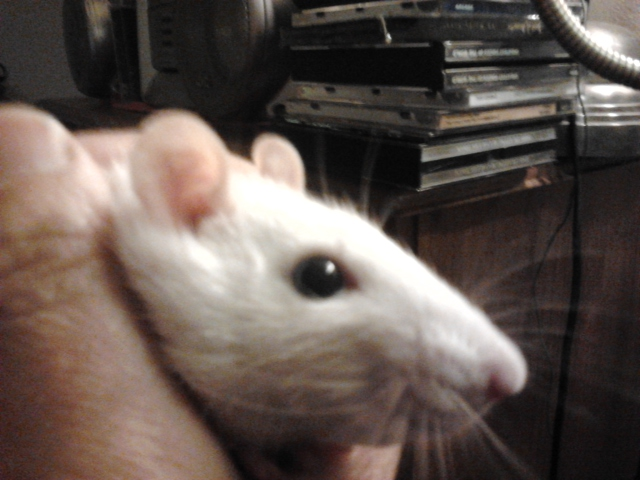 rat eye issue
Question
normal eye bad eye
Hi again nata
rat eye issue
Question
normal eye bad eye
Hi again nata
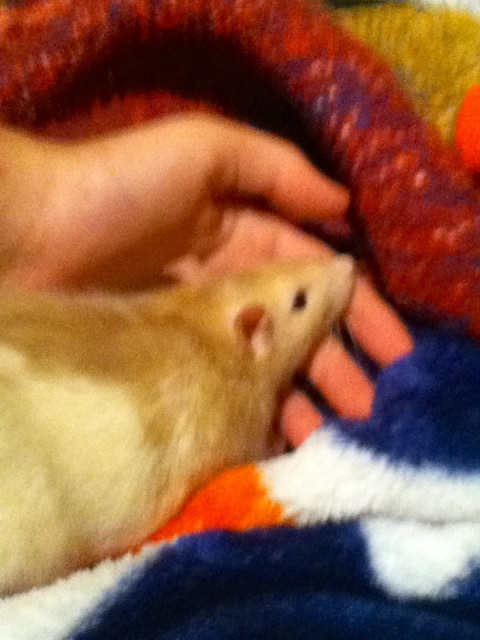 Scared, neglected rat needs a friend
QuestionDustin
Dustin
QUESTION: Dear Nata
Scared, neglected rat needs a friend
QuestionDustin
Dustin
QUESTION: Dear Nata
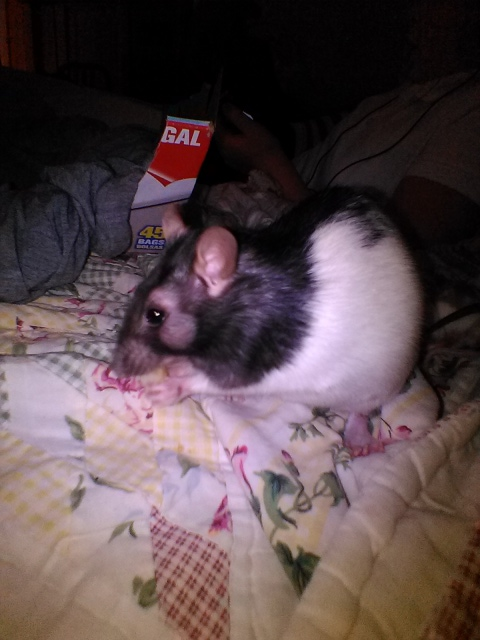 mom rat may have abscess
Question
rat abscess?
our rat had a litter of 1
mom rat may have abscess
Question
rat abscess?
our rat had a litter of 1